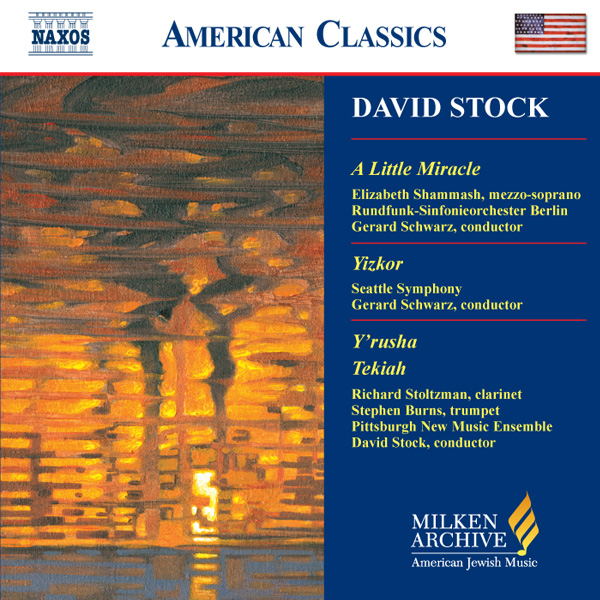Tracks
Track |
Time |
Play |
| I. Light, airy, propulsive | 06:12 | |
| II. Warm, flexible tempo; Fleeting, scurrying | 08:08 | |
| III. With energy, relentlessly | 04:59 |
Liner Notes
Stock’s Tekiah [t’ki’a], is a three-movement work for trumpet and chamber orchestra. The word tekiah translates from the Hebrew literally as “sounding,” but it is most commonly associated with the sounding, or blowing, of the shofar and its required hearing on Rosh Hashana (notwithstanding the various functions of the shofar on other occasions, both historically and in contemporary usage). More specifically, t’ki’a is the name of one of the three plaintive call patterns—mostly outlining the interval of a perfect fifth—according to which the shofar is blown on Rosh Hashana and at the conclusion of Yom Kippur. The ordinary (short) t’ki’a ends abruptly. The prolonged t’ki’a g’dola (great t’ki’a), employed as a finale to a series of shofar blasts, is generally sustained to the limits of the blower’s breath.
In Stock’s mercurial frolic here through the minefields of virtuoso display and agile tonguing techniques, the trumpet might be perceived as a modern incarnation of the ancient shofar—but only as a departure point in terms of overall effect, with little actual reference to the emblematic intervals of shofar calls. The most obvious reflection of shofar patterns is heard in the recurring successions of rapid and repeated staccato and staccato-like figures—especially in the first and third movements—which recall, in combination, two other characteristically sputtered shofar calls, sh’varim and t’ru’a, even more than recalling t’ki’a itself. These dry, galloping, and swiftly paced figures are developed and transformed continuously in a motoric, ever-evolving, almost neo-Baroque pitter-patter, requiring a highly skilled trumpeter. “As a former trumpet player,” Stock has explained, “I wanted to challenge the soloist to the limit, while still staying within the bounds of mainstream trumpet technique.”
In the more lyrical, songlike second movement—which contains within it a short-lived scherzo—muted trumpet passages lend a blues ambience. This leads directly to the playful third movement, which is built largely on the stuttered single-pitch triplet motive presented at the outset.
Tekiah was composed at the MacDowell Colony and in Pittsburgh in 1987, on commission from the Three Rivers Arts Festival, during whose 1988 season it was premiered by Stephen Burns and the Pittsburgh New Music Ensemble.
Credits
Composer: David StockPerformers: Stephen Burns, Trumpet; Pittsburgh New Music Ensemble; David Stock, Conductor
Editing: Pittsburgh Digital Recording & Editing Company
Mastering: Francisco J Rodriguez, Digital Dynamics Audio, Pittsburgh, Pennsylvania
Production Assistants: Jeffrey Stock and Rossen Milanov
